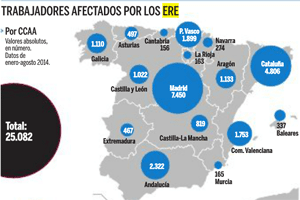
Companies can make an ERE and then subcontract the service
A final ruling opens the door for companies to lay off and later subcontract and, in this way, "ensure their viability or shore up competitiveness."
The Supreme Court has issued a highly relevant ruling, which will represent a turning point in labor relations. The Supreme Court opens the way for companies to carry out an ERE and then subcontract the service provided by the dismissed employees. Thus, the High Court has endorsed the ERE of 410 NH Hoteles employees that was carried out to subcontract at a lower cost, in a ruling that allows companies to take advantage of the measures provided for in the labor reform in order to gain competitiveness and flexibility. .
The High Court strikes down the unions' appeal because it considers that it is poorly presented and fails to comply with legal requirements. This ruling, to which EXPANSIÓN has had access, was highly anticipated by companies and the legal sector, and is now final. The Supreme Court thus endorses the previous ruling of the National Court that approved this measure because it understands that it has been done "to ensure the viability of the company or to shore up competitiveness."
It is also the first ruling that affects a hotel group, and that takes into account its business and organizational particularities, with seasonal activity greatly affected by the crisis. He has advised NH Sagardoy Abogados and the economic consultancy has been carried out by Equipo Economico.
In a pioneering ruling, the court does not believe that the company incurred bad negotiating faith, as the unions alleged and other judges who have annulled collective dismissals carried out to outsource jobs have considered.
The unions alleged the absence of justifying causes since, although NH claimed losses, they claimed that there were profitable hotels, that an Asian group had invested 234 million and another group was going to contribute 70 million, and that the persistent decrease in income was not proven.
Furthermore, worker representatives denounced that the selection criteria were discriminatory. Of the 410 laid off, 285 (about 70%) were women.
The ruling understands that there is no discrimination based on sex due to the fact that the majority of the affected workers are women when the affected group by virtue of their professional classification was also predominantly female. Nor does the impact of an area (housekeepers) where mostly women work imply discrimination.
For its part, NH denied that it had negotiated in bad faith, since the company's initial claims were reduced and an agreement was reached for 63,10% of representation. The group is made up of 397 hotels in 25 countries, of which 16 are affected.
Operating losses as of December 21, 2012 were 66.9 million, and if the depreciation of assets was computed, they reached 292 million. Thus, the fall in the net amount of the turnover has gone from 1,456 million in 2008 to 1,288 million in 2012, a decrease of 11.5%. Within the group, Spain is the unit with the greatest deterioration, with a decrease in income of 27.2 million in 2012.
The company admitted that a Chinese group had provided financing, but that it had barely made it possible to meet immediate debts. Added to this is that NH argued that its managers and workers with salaries higher than the agreement have reduced their salaries between 5% and 10%.
The group explained that it had adopted measures to reduce costs, but an extinctive adjustment was still necessary in the hotels in the worst situation. He defended that outsourcing is a legal path, justified by the existing economic and productive problems. The company offered a relocation guarantee in the contractor companies of the 90% of the workers, with 25 days of salary per year for relocated workers and 30 days for the rest.
The ruling considers that the outsourcing of a part of the activity to reduce costs does not imply a violation of good faith in negotiations, when the resort to subcontracting is not due to pure convenience and business strategy to increase profits, but rather is raised as a formula for survival in the face of increasing losses and a very high level of debt, thus seeking to reduce labor and investment costs and facilitate the ability to adapt to demand.
"We are, therefore, faced with a situation in which subcontracting is a useful and rational means to underpin the viability of the company and its competitiveness," the High Court emphasizes.
The fact that it represents a reduction in the working conditions of housekeepers, he admits, "is like that and is absolutely regrettable", but there is no right to direct hiring nor is there any duty on the part of the company to refrain from subcontracting parts. of their activity.



